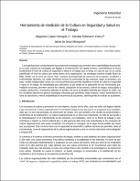Please use this identifier to cite or link to this item:
https://repositorio.uco.edu.co/jspui/handle/20.500.13064/1482Full metadata record
| DC Field | Value | Language |
|---|---|---|
| dc.rights.license | http://creativecommons.org/licenses/by/3.0/ | - |
| dc.contributor.author | Echeverri-Yoria, Nicolas | spa |
| dc.contributor.author | López-Hincapié, Alejandro | spa |
| dc.coverage.spatial | Sudamérica, Colombia, Rionegro, Antioquia | es_ES |
| dc.date | 2021-12-16 | - |
| dc.date.accessioned | 2022-09-16T16:29:03Z | - |
| dc.date.available | 2022-09-15 | - |
| dc.date.available | 2022-09-16T16:29:03Z | - |
| dc.date.issued | 2021-12-16 | - |
| dc.identifier.uri | https://repositorio.uco.edu.co/handle/20.500.13064/1482 | - |
| dc.description.abstract | Las organizaciones constantemente buscan generar estrategias que permitan tener sostenibilidad empresarial, en su gran mayoría las estrategias van ligadas a la intervención del capital humano, convirtiéndose en factor fundamental el nivel de cultura de seguridad y salud en el trabajo que se tenga, en caso de que no se cuente identificado el nivel de cultura que existe dentro de la organización, las estrategias tendrían amplio factor de falla. Contar con un nivel de cultura “bajo” aumenta la probabilidad de ocurrencia de accidentes, incidentes y enfermedades laborales, los cuales afectarían incluso la continuidad de las empresas, según la gravedad,; por tanto, resulta indispensable contar con una herramienta que permita identificar el nivel de cultura en seguridad y salud en el trabajo, la metodología que utilizamos es por medio de la aplicación de una herramienta que, mediante encuestas, permiten conocer los valores, aceptación de las normas, control de riesgos, autocuidado y cuidado colaborativo, el esquema utilizado es similar a la curva de Bradley diseñada por Dupont en 1995, con los resultados lograremos generar estrategias enfocadas que permitirán mejor impacto, mayor asertividad en la toma de decisiones y menor probabilidad de ocurrencia de accidentes, disminuyendo los índices de accidentes. | spa |
| dc.format.extent | 8p. | es_ES |
| dc.format.mimetype | application/pdf | spa |
| dc.language.iso | spa | es_ES |
| dc.rights | info:eu-repo/semantics/openAccess | spa |
| dc.rights.uri | http://creativecommons.org/licenses/by-nc-sa/2.5/co/ | spa |
| dc.subject | Cultura | es_ES |
| dc.subject | Nivel | es_ES |
| dc.subject | Organización | es_ES |
| dc.subject | Seguridad y salud en el trabajo | es_ES |
| dc.title | Herramienta de medición de la cultura en seguridad y salud en el trabajo | spa |
| dc.type | Master thesis | spa |
| dc.description.abstractenglish | Organizations constantly seek to generate strategies that allow for business sustainability, The vast majority of strategies are linked to the intervention of human capital, becoming a factor the level of culture of safety and health at work that is had is fundamental, in case it is not counted Once the level of culture that exists within the organization has been identified, the strategies would have a broad factor of failure. Having a “low” level of culture increases the probability of accidents, incidents and occupational diseases, which would even affect the continuity of the companies, depending on the severity; for Therefore, it is essential to have a tool that allows identifying the level of safety culture and occupational health, the methodology we use is through the application of a tool that, Through surveys, they allow to know the values, acceptance of the rules, risk control, self-care and collaborative care, the scheme used is similar to the Bradley curve designed by Dupont in 1995, with The results will be able to generate focused strategies that will allow better impact, greater assertiveness in the decision-making and lower probability of accident occurrence, reducing accident rates. | eng |
| dc.subject.subjectenglish | Culture | es_ES |
| dc.subject.subjectenglish | Level | es_ES |
| dc.subject.subjectenglish | Organization | es_ES |
| dc.subject.subjectenglish | Safety and health at work | es_ES |
| dc.subject.lemb | Seguridad industrial | es_ES |
| dc.subject.lemb | Recursos humanos | es_ES |
| dc.subject.lemb | Seguridad en la organizaciones | es_ES |
| dc.subject.lemb | Formación y Capacitación laboral | es_ES |
| dc.subject.lemb | Métodos de simulación | es_ES |
| dc.subject.lemb | Brigadas de seguridad | es_ES |
| dc.type.hasversion | info:eu-repo/semantics/acceptedVersion | spa |
| dc.audience | Interés general | spa |
| dc.rights.accessrights | Open Access | spa |
| dc.rights.spa | Acceso abierto | es_ES |
| dc.rights.cc | Atribución-NoComercial-CompartirIgual 2.5 Colombia | spa |
| dc.publisher.department | Ingeniería | es_ES |
| dc.publisher.program | Especialización en alta gerencia de sistemas integrados de gestión | es_ES |
| dc.description.city | Rionegro | spa |
| dc.contributor.corpauthor | Universidad Católica de Oriente. Facultad de Ingeniería | spa |
| dc.identifier.bibliographicCitation | Echeverri Yoria, Nicolas; López Hincapié, Alejandro. Herramienta de medición de la cultura en seguridad y salud en el trabajo (Tesis) Rionegro, Antioquia: Universidad Católica de Oriente; 2021. 8p. | es_ES |
| dc.type.driver | info:eu-repo/semantics/masterThesis | spa |
| dc.type.coar | http://purl.org/coar/resource_type/c_bdcc | spa |
| dc.type.redcol | https://purl.org/redcol/resource_type/TM | spa |
| dc.type.local | Tesis/Trabajo de grado - Monografía - Maestría | spa |
| Appears in Collections: | Especialización en Alta gerencia para Sistemas Integrados de Gestión | |
Files in This Item:
| File | Description | Size | Format | |
|---|---|---|---|---|
| Tesis.pdf | 241.36 kB | Adobe PDF |  View/Open | |
| Autorización depósito.pdf Until 2050-12-31 | 254.96 kB | Adobe PDF | View/Open Request a copy |
This item is licensed under a Creative Commons License

